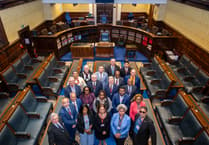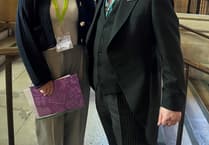A former economic advisor to the government has told the inquiry into the area plan for the east that the 2016 census figure was wrong.
Stephen Carse told the inquiry chairman Michael Hurley that the census, which saw a decrease in the island’s population, was wrong and blamed the method for collecting the data.
Mr Hurley opened the section of the meeting looking at population figures by highlighting the drop in population from 84,497 people in the 2011 census to 83,314 in 2016.
However, Mr Carse, who is working with but not for property developer Dandara as an independent consultant, said that evidence including tax records and electricity accounts show that the figure was incorrect.
He said that his submission to the inquiry ’was the only one’ which sought to question the census results, that nothing in the period 2011 to 2016 had provided an indication of the drop in population and that the method of collecting the census data, by post, will always deliver a lower response rate and that affected the figures.
Mr Carse, who was involved in census collection prior to his retirement from government, told the inquiry that during the period, the island showed continuous growth in GDP. He said that in the Isle of Man it has ’always been accepted’ that when the economy grows, it coincides with a population increase.
He added that if the census was right it would have been ’totally out of line’ with any before it. It would be an ’economic miracle’ for the numbers of the economically active population to have fallen so much without affecting the economy badly.
According to the census, the economically active population decreased to 42,777 in 2016, down from 44,609 in 2011. The number in employment fell to 41,636 from 43,134 in 2011.
Mr Carse said he believed the figure was wrong due to the method used to collect the data. The 2016 census was done by post, which typically provides a lower rate of responses than other methods.
Adam Smith, head of the economic affairs unit, said the census was not only compiled using the postal data, but other sources including the electoral roll and child benefits.
Mr Smith told the inquiry there ’has been quite a change’ in the island’s economy and that the shift from banking as the island’s main industry to e-gaming and other more technological industries and they don’t require the same number of workers as banking.
Mr Carse disputed this and pointed out that the number of workers in those sectors rose from 9,400 to over 10,000 during the 2011 to 2016 period.
However, Guy Templer, who was at the inquiry representing Santon residents, said that the e-gaming industry ’didn’t exist’ until 15 years ago and its growth in the island has been large. The industry now accounts for more than 17% of the island’s national income.
target
He said that while the industry has brought people to the island, it has not been a large number. Mr Templer repeated the admission by the Cabinet Office that its target of 500 net migration a year had not been reached since 2011, which supported the lower than expected population figure.
Middle MHK Bill Shimmins said that he supported the 2016 figure and that during campaigning for that year’s general election he found many empty properties in his constituency. When he spoke to Douglas members, they had told him the same.
Mr Shimmins noted that unemployment in the island has dropped significantly from 2013 to 2019. In April 2013, the number of unemployed people stood at 1,108, whereas in the same month this year, the figure was 314. He said this will have covered the drop in migration to the island.
Paul Craine, who has written extensively about the island’s population figures in previous years, said that by 2015, the island was showing evidence of a shrinking population including a drop in work permit applications and smaller school class sizes, particularly in primary schools.
He added that while the number of households remained similar, people aged over 20 were leaving the island for work, however their parents remained, explaining the fall in population without a fall in households.
Despite this, Mr Carse stuck by his statement, adding that he ’sees nothing’ in the island’s economic figures to suggest the drop in working population and that if the figures were right ’it would have been a massive change to the island’s economy’ and GDP.
However, John Webster, who is chairman of the Manx E-gaming Association said that the wages paid by the sector had ’distorted’ the relationship between the island’s GDP and population.
He also warned that due to changes in legislation elsewhere in Europe, the island ’no longer has the unique selling point it once had’ with the e-gaming industry. As a result of this, he said the industry will not continue to grow as rapidly and drive the economy as it has before.





This article has no comments yet. Be the first to leave a comment.